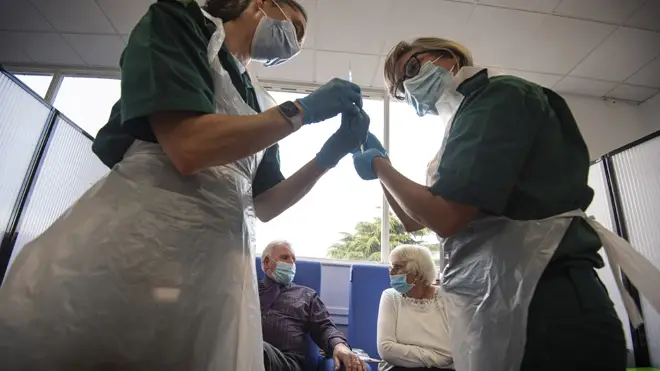
Tom Swarbrick 4pm - 6pm
12 December 2020, 07:08 | Updated: 12 December 2020, 07:10

The US has become the fourth nation to approve the Pfizer/BioNTech coronavirus vaccine after the UK, Bahrain and Canada with President Donald Trump calling it one of the greatest scientific achievements in history.
Vaccinations for health workers and nursing home residents are expected to begin in the coming days after the Food and Drug Administration (FDA) authorised the emergency rollout of the vaccine.
White House chief of staff Mark Meadows pressed FDA chief Stephen Hahn to grant an emergency use authorisation for Pfizer's vaccine by the end of the day or face possible firing, according to two administration officials.
Mr Meadows spoke to Dr Hahn by telephone on Friday and told him his job was in jeopardy if the emergency use authorisation was not issued before Saturday, according to a senior Trump administration official who spoke to The Associated Press on condition of anonymity.
The ultimatum is understood to have come at President Donald Trump's direction.
Friday's threat marked the latest attempt by the Trump administration to override government scientists working to combat the deadly pandemic.
Even with an FDA decision expected within hours, Mr Trump and his deputies proved unwilling to let regulators work through their careful review, which includes drafting safety warning labels and instructions for physicians.
Dr Hahn disputed as "untrue" these characterisations of his conversation with Mr Meadows.
Listen & subscribe: Global Player | Apple Podcasts | Google Podcasts | Spotify
But Mr Trump tweeted directly at Dr Hahn earlier on Friday, complaining that the FDA "is still a big, old, slow turtle". Mr Trump has publicly lambasted the pace of the FDA's vaccine review process.
"Get the dam vaccines out NOW, Dr. Hahn," Mr Trump tweeted. "Stop playing games and start saving lives."
Initial doses of the approved vaccine in the US are scarce and rationed as the country joins Britain and several other nations in scrambling to vaccinate as many people as possible ahead of a long, grim winter. It will take months of work to tamp down the coronavirus that has surged to catastrophic levels in recent weeks and already claimed 1.5 million lives globally.
The move sets off what will be the largest vaccination campaign in US history - but it also has global ramifications as a role model to many other countries facing the same decision.
It offers the ability "in this situation where the pandemic is out of control, to bring hope to the people", Dr Ugur Sahin, CEO of BioNTech, told The Associated Press.
The world desperately needs multiple vaccines for enough to go around, and the Pfizer-BioNTech shot is the first based on rigorous scientific testing to emerge from that worldwide race - a record-setting scientific achievement that shaved years off the usual process.
"I don't think you would have found a scientist on this planet that would have predicted this 11 months ago," said Dr Paul Offit, a vaccine expert at Children's Hospital of Philadelphia who advises the FDA.
The US is considering a second vaccine, made by Moderna, that could roll out in another week. In early January, Johnson & Johnson experts to learn if its vaccine is working in final testing.
Europe is set to make its own decision on the Pfizer-BioNTech and Moderna shots later this month, an important step as some other candidates that multiple countries were anxiously awaiting have hit roadblocks.
Friday, Sanofi and GSK announced a months-long delay after early tests showed their vaccine did not work well enough in older adults.
And China and Russia did not wait for final-stage tests before beginning vaccinations with some homegrown shots.
Mr Trump said late on Friday that Pfizer had "passed the gold standard of safety" in a video statement hailing the vaccine as "one of the greatest scientific accomplishments in history".
Some three million doses of the Pfizer-BioNTech vaccine are expected in the first shipments around the country, according to officials with Operation Warp Speed, the Trump administration's vaccine development program. A similar amount is to be held in reserve for those recipients' second dose.
The government still is hammering out final recommendations, but expected to follow health workers and nursing homes are other essential workers, older adults and people at high risk because of other health problems.
US authorities do not expect enough for the general population before spring, and that is assuming there are no manufacturing glitches.